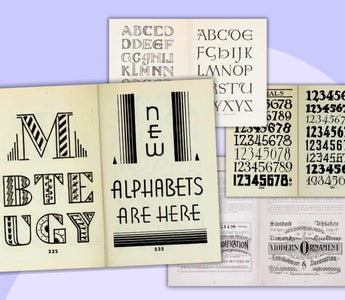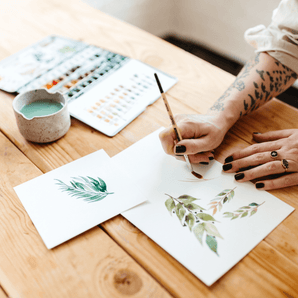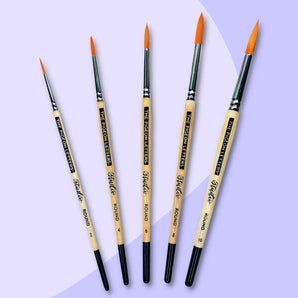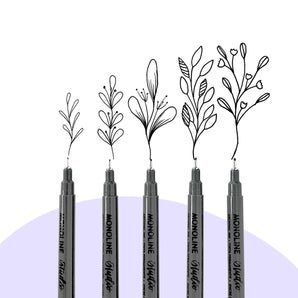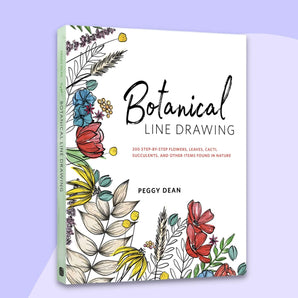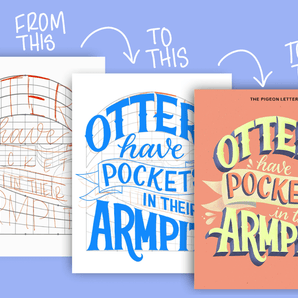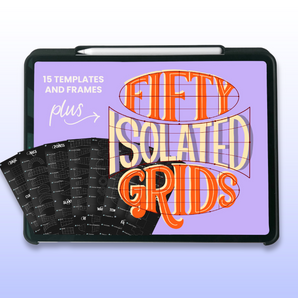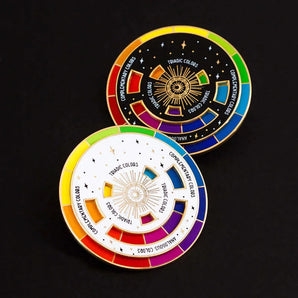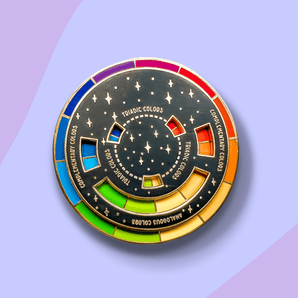So there I was, wandering through the dusty shelves of an online public archive, feeling like if I spent even 5 more minutes doing so would cause my allergies to start up through the screen. I knew I'd found enough resources I was searching for, but something was tugging me to go further down the virtual grandma's-attic-smelling rabbit hole.
Right when I felt like I'd discovered allll of the a la carte imagery I could, I stumbled upon a hidden gem for letter enthusiasts (*ahem* me). So, being a hand lettering artist, I couldn’t resist clicking through. Let me tell you, it was like finding a secret alley with solid 4-out-of-5-stars ramen (because does the perfect--I mean truly perfect--ramen truly exist?).
I was originally looking for vintage typography and hand lettering used in posters, tickets, bulletins, packaging, etc. to provide to my students in Procreate Lettering Lab, but like always, put me on a research task and I'll go further than ever needed. Why can't I let Pinterest be enough? I'LL TELL YOU WHY (sorry for yelling):
Why [Pinterest] doesn't check all the resource boxes
Don't get me wrong. I love Pinterest/Instagram/etc. as much as the next guy/gal/folk. I love that its algorithm can even detect "similar posts" related to compositions, colorways, and specifics like serif studies and incorporated flourishes and swashes. What a beauty of a feed. But-- There's a missed opportunity if it's the only place we jump into when we're looking for examples.
Pinterest often misses the mark on:
Story-Driven Context
Social media platforms like Pinterest are great for visuals but often lacks the rich historical background that can provide deeper contextual insights into the evolution of typography and lettering styles, along with the way we can use inspired styles to infuse storytelling in our artwork.
Authentic Age-Old Lettering & Typography
Pinterest is a copy of a copy of a copy. It lacks the undiluted essence of vintage lettering. The endless repinning and sharing can dilute the originality and authenticity of the content. What you see might be far removed from its original source, making it hard to trace back to its roots. Authenticity matters, especially when you’re looking for genuine inspiration from vintage typography and lettering. It's just more exciting when we have a rooted source.
Nuances in Lettering Styles
Modern images don’t come with the annotations and insights that provide a deeper understanding of each piece. Sure, you can find plenty of beautiful images, but where’s the information that tells you why it’s significant? Sometimes the links are solid, but it's UGC (User Generated Content). I could just as easily post an image of lettering style and link it to my blog. That might help you, but it also might not. Without the true sources, you miss out on the full educational experience. Understanding the nuances, techniques, and historical significance behind each piece is crucial for truly appreciating and learning from it. And when you actually dive into that exploration, it's a true treat.
Lettering Variety and Depth
Social media platforms are great mood boards, but they don't offer the vast range of forgotten styles and rare finds (where are my estate girlies at?). These platforms tends to show you more of the same, driven by algorithms of more of the same that you've already seen and liked to keep you engaged. This can limit your exposure to a broader spectrum of styles and historical references. If you’re looking for a deep dive into lettering and typography, don't you want more than a shallow pond to play in?
My Gold Mine Lettering Finds
Okay that's enough of that. Let me share what I found in my treasure hunt. During my digital spelunking, I came across a handful of old books that have been made available to the public. Every. Dang. Page. These books are the gems you discover by accident, like a painting you snag from someone else's trash and you turn it into a treasure and everyone who comes over is giving serious envy. It's that feeling, but for hand lettering artists and typographers.
The books I'm sharing are a delight because they give you something more than regurgitated styles. And they've had a break so they're ready to make a comeback. Here's a bit of what you'll find, and why it's exciting to get your hands on these type of resources:
- Ancient scripts: You get to dive into the building blocks of written history, filled with early alphabets that set the foundation for all the lettering we use today. These lettering styles are the roots of our modern alphabets, providing a historical context that enriches our understanding of letterforms.
- Medieval manuscripts: Intricate, illuminated letters that are both beautiful and functional, that especially aid in guiding through dense walls of text. The craftsmanship and artistry of these manuscripts offer a resource for detailed, decorative lettering.
- Modern typefaces: Yep, even the letters that have stood the test of time that give us that drool-worthy clean, readable designs. These are the lettering styles that emerged with the printing press, highlighting the evolution towards practicality in typography and lettering. The examples you'll find in this category show the shift from hand-drawn letters to more standardized forms, perfect for production and easy readability. Just think of all the ways you can transform these styles to bring them to life with your unique flair ...
Each page of these vintage books is a new adventure through time and place. It’s not just about aesthetics—it’s about understanding the balance of art and function in typography to help you shape exactly what you want to in your own creativity.
These 5 hand lettering books are free and yours to explore:
1. Alphabets Old and New (published in 1910)

Includes:
- Old alphabets arranged in order of date
- Character which comes of using pen, chisel, etc.
- Modern alphabets in which the influence of the implement employed is not so evident
- Ampersands and numerals
You can download the full book right here.
If you want a physical copy, there are plenty of resellers that have those too.
2. Letters & Lettering: A Treatise of 200 Examples (published in 1902)

Includes:
- Roman capitals
- Modern Roman letters
- Gothic letters
- Italics and script
You can download the full book right here.
3. Studio Handbook: Lettering (1931)

Includes:
- Lettering elegance of the Art Deco period
- Modern graphics
- Ornamental borders, ribbons, etc.
You can download the full book right here.
If you want a physical copy, there are plenty of resellers that have those too.
4. Sign Painting Course (1954)

Includes:
- Lettering elegance of the Art Deco period
- Modern graphics
- Ornamental borders, ribbons, etc.
You can download the full book right here.
5. Zanerian Manual of Alphabets (1895)

Includes:
- Round hand lettering
- Engrossing
- Designing
- Pen and brush
You can download the full book right here.

